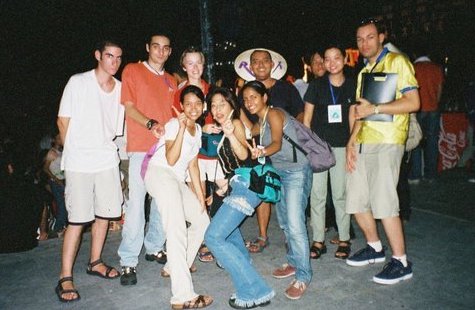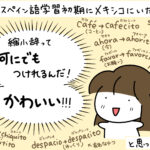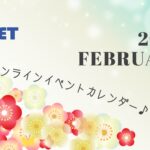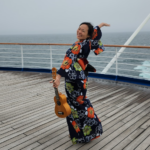GET はじまりの物語:GETプログラム誕生秘話【前編】
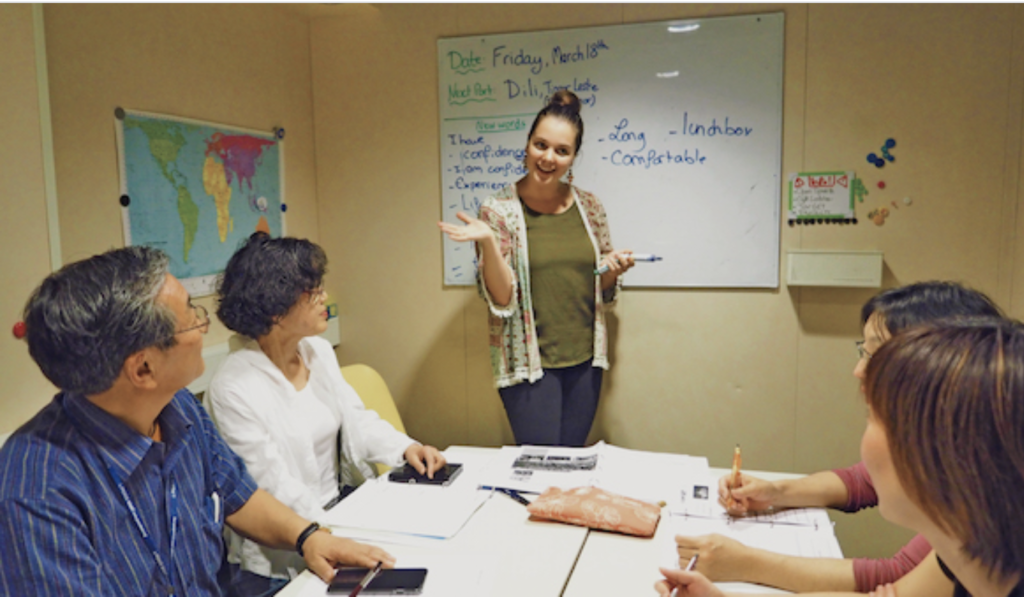
皆さん、こんにちは。
GETでは、クルーズ船で地球を一周をしながら 世界の人々とつながるための英語とスペイン語を学ぶ、ユニークな語学プログラムを提供しています。
ただそんなGETのプログラムがどのように始まったのかをお伝えする機会が、今まであまりありませんでした。
昨年GETの創設者の1人である Rachael Armstrongに改めて当時の話を聞き、その話を基に元スタッフの Sarah Andersonが英文記事を作成しました。
(ピースボート英語HPに記載:https://peaceboat.org/english/news/Creating-GET)
今回はその記事を、日本語訳と一緒に掲載し「GET はじまりの物語:GETプログラム誕生秘話」と称してみなさんにお届けします!
こちらのページは、【前編】です。
お読みいただき、GETの歴史や想いを知っていただけると嬉しいです。Happy reading!
The Global English/Español Training Programme (a.k.a. GET) is a longtime staple of Peace Boat’s global voyages and a fixture of Peace Boat’s presence in Tokyo. GET is a unique language school that teaches communication through task-based learning and recognizes the value of language as a peace-building tool. But this beloved Peace Boat program has not always been around – and, in fact, came about almost by accident.
GET (グローバルイングリッシュ・エスパニョールトレーニングプログラム)は、ピースボートの世界一周の船旅で大事な部分を長年に渡り担ってきました。そしてピースボートの東京での活動の重要なプログラムの1つでもあります。
GETはタスクベース(課題解決型)の学習を通してコミュニケーションを学び、平和構築のツールとしての言語の価値を尊重する、ユニークな語学学校です。しかし、皆に愛されてきたこのピースボートのプログラムは、最初から存在していた訳ではありません。いくつかの偶然が重なり合い誕生したプログラムなのです。
By 1998 Peace Boat had been organizing voyages for fifteen years, and was about to launch its first voyage from Liverpool, England. In an effort to internationalize the onboard community, Peace Boat posted an ad in British newspaper The Guardian announcing an opportunity for Brits with an interest in peace-building to join the upcoming 24th Global Voyage. One such peace-builder was future GET co-founder, Rachel Armstrong.
1998年、ピースボートは既に15年に渡りクルーズを企画し、始めてイギリスのリバプールを出航地とするクルーズを始めようとしていました。船内のコミュニティを国際化するために、ピースボートはイギリスの新聞 The Guardian(ガーディアン)紙に、平和構築に興味のあるイギリスの人々に向けて これから出航する第24回クルーズへの参加を呼びかける広告を掲載しました。その案内に導かれて参加した 平和構築者の1人が、未来のGETの創設者の1人となるレイチェル・アームストロングでした。
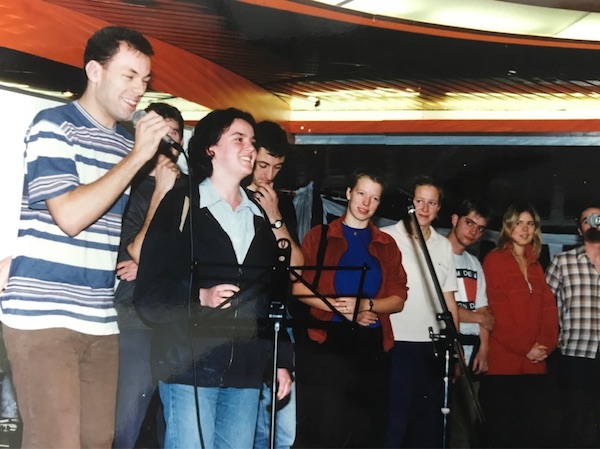
Rachel had just returned from teaching in Japan with the Japan Exchange and Teaching Program (JET), a Japanese government program that places foreigners at public schools to teach English and foster international exchange. She saw the ad for Peace Boat in the paper over breakfast. “I thought, oh wow, this is so exciting, this is what I want to do,” she says. She had long been interested in anti-nuclear issues and peace-building, so Peace Boat was the perfect fit. She remembers thinking, “I’ve got to get a place on that ship.”
レイチェルは、「JETプログラム」を終え、日本から丁度戻ってきた所でした。(JETプログラムとは、外国人が日本の公立学校で英語を教えることを通して、国際交流を推進するプログラム。)レイチェルは、朝食を摂りながら新聞を読んでいるときに、ピースボートの広告に出会いました。「わ!なんて面白そうなんだろう。これが私のやりたいことだ、と思った」と言います。長い間、反核について、そして平和について関心のあった彼女にとって、ピースボートは見事に彼女の関心事と合致したのでした。そして「あの船に乗らなくちゃ」と思ったそうです。
So Rachel submitted an essay and went for an interview at a Peace Boat office in London. Less than two months later, she and friend Daniel Vincent, another former JET teacher, boarded the ship as two of ten selected scholarship students. These students would come to be known as the Guardians, so named for the newspaper ad they responded to.
レイチェルはエッセイを提出し、ロンドンにあったピースボートの事務所で面接を受けました。それから2ヶ月もしないうちに、彼女と同じくJET教師でもあった友人の ダニエル・ヴィンセントと奨学生10人の内の2人として船に乗り込んでいました。彼らは申し込みのきっかけとなった広告が掲載されていた新聞にちなみ ‘Guardians(ガーディアンズ)’として知られるようになっていきました。
At first, the Guardians weren’t sure about their role on the ship. However, they soon discovered the secret that makes Peace Boat voyages so rewarding: jishukikaku, or self-organized events. “We started to understand that to enjoy this, we should contribute,” Rachel says. They started to think about what they could do, and for Rachel and Daniel, there was a clear answer. “We had just finished two years on the JET Programme,” Rachel says. “So what we knew how to do was eikaiwa.” Eikaiwa is Japanese for English conversation lessons.
最初、ガーディアンズたちは自分たちの船内での役割がよく分かっていませんでした。しかし、すぐに「自主企画」と呼ばれる乗船者自身が企画するイベントが、ピースボートの船内生活を面白いものにしていることに気がつきました。「この経験を楽しむためには、自分たちが貢献する必要があることに気づき始めました」とレイチェルは言います。自分たちには何ができるかを考えた時、2年間のJETプログラムを終えたばかりのレイチェルとダニエルには、明確な答えがあったと言います。「私たちには英会話がある!」と。
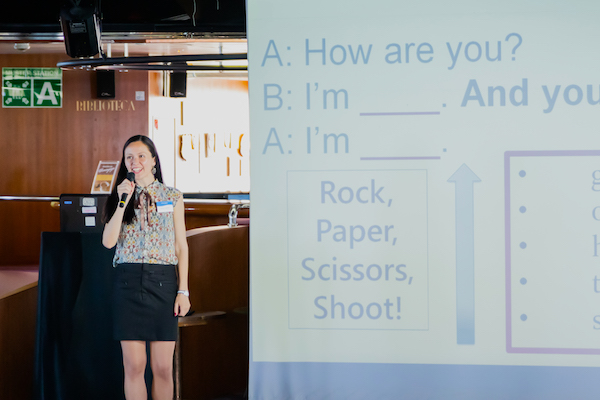
Rachel and Daniel decided they would use their English teaching experience to make engaging, fun English classes, open to everyone on the ship. The lessons proved popular, and the two teachers organized three of these open lessons a day, one for each level of English learner: Beginner, Intermediate, and Advanced. “It was a huge hit on board,” Rachel remembers. Soon enough other Guardians got involved, and they began organizing other events such as treasure hunts and a language olympics.
レイチェルとダニエルは 自分たちが英語を教えてきた経験を活かして、船内の誰もが参加できる参加型の楽しい英語クラスを作ることに決めました。2人のレッスンは人気で、1日に3回、初級・中級・上級とそれぞれのレベルに合わせた公開レッスンを行いました。「船内で大人気の企画となりました」とレイチェルは当時を振り返ります。やがて他の ガーディアンズたちも加わり、宝探しやランゲージ・オリンピックなどのイベントを開催するようになりました。
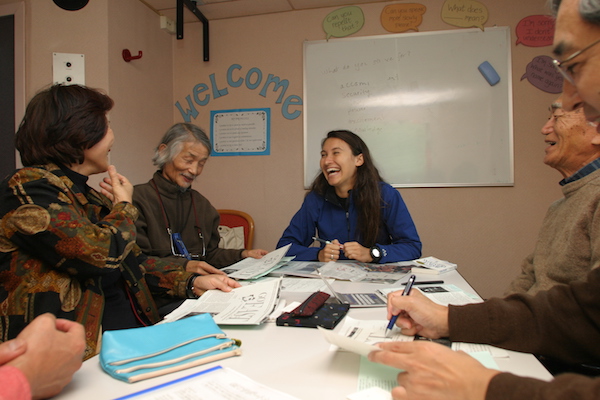
However, about half-way through the voyage it became clear that some Peace Boat participants were interested in more serious language learning. For these participants Rachel and Daniel organized smaller English classes that would meet ten times for more intensive language lessons. By the end of the voyage, this organically grown program became a central part of the onboard community, and both Rachel and Daniel were invited to continue teaching on the next voyage.
ところが、クルーズも中盤へ差し掛かった頃、ピースボートの参加者の中には、もっと真剣に語学に取り組みたいと思っている人がいることが分かりました。そのような参加者のために、レイチェルとダニエルはさらに集中的なレッスンを10回程行いました。クルーズの終盤には、この偶然に始まったプログラムは、船内の中心的なコミュニティへと成長していました。そしてレイチェルとダニエルは、次のクルーズでも英語を教えないか、と誘われたのでした。
<後編へつづく>
